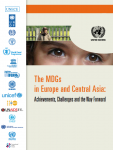“The MDGs in Europe and Central Asia: Achievements, Challenges and the Way Forward” reviews the achievements in the UNECE countries towards reaching the MDGs and shows mixed results.
 April 2011: The UN Economic Commission for Europe (UNECE) has published the report “The MDGs in Europe and Central Asia: Achievements, Challenges and the Way Forward.”
April 2011: The UN Economic Commission for Europe (UNECE) has published the report “The MDGs in Europe and Central Asia: Achievements, Challenges and the Way Forward.”
The report was prepared by UNECE, the UN Development Programme (UNDP), the UN Environment Programme (UNEP), the UN Food and Agriculture Organization (FAO) and other UN bodies. According to the foreword by UNECE Executive Secretary Ján Kubis, the review of achievements in the UNECE countries shows mixed results.
On one hand, remarkable progress has been achieved on the poverty front during the 2000-2008 period of vibrant economic growth, and a bounce-back from the deep transition recession in the emerging economies. Major progress was also made in other MDG-related areas, such as food security, women’s employment, child and maternal mortality and, in the field of environmental sustainability, in energy efficiency. On the other hand, progress has been quite uneven, with large and persistent disparities between sub-regions and countries, as well as between geographical areas and population groups within countries.
On MDG-7 (environmental sustainability), the report notes that tangible progress has been made in integrating the environmental dimension into sectoral policy-making, reducing carbon dioxide emissions, increasing energy efficiency and strengthening the sustainable management of forests. The report also notes, however, that: the level of greenhouse gas (GHG) emissions remains too high in Western Europe; considerable efforts need to be made for improving energy efficiency in Eastern Europe, the Caucasus and Central Asia (EECA); access to safe drinking water is still a major problem in rural areas of countries of south-east Europe; and the number of households living in informal settlements is increasing in a number of countries of the EECCA and south-east Europe regions.
The report formulates a series of recommendations, including to: enhance regional cooperation to address major MDG-related transboundary issues, such as international migration, cross-border water management, trade and transport facilitation, and climate change adaptation and mitigation; and maintain the existing ODA level for the lower income countries of the region and intervene for relaxing the conditionality of the international financial institutions on loans to emerging economies hardly hit by the economic downturn. The report’s overall conclusion with regard to stepping up the pace of progress on MDG-7 targets by 2015 is that a paradigm shift is needed towards lower carbon-intensive development paths, green growth, sound water management, resource efficient and cleaner production, more sustainable consumption patterns, and improved urban planning. [Publication: The MDGs in Europe and Central Asia: Achievements, Challenges and the Way Forward]